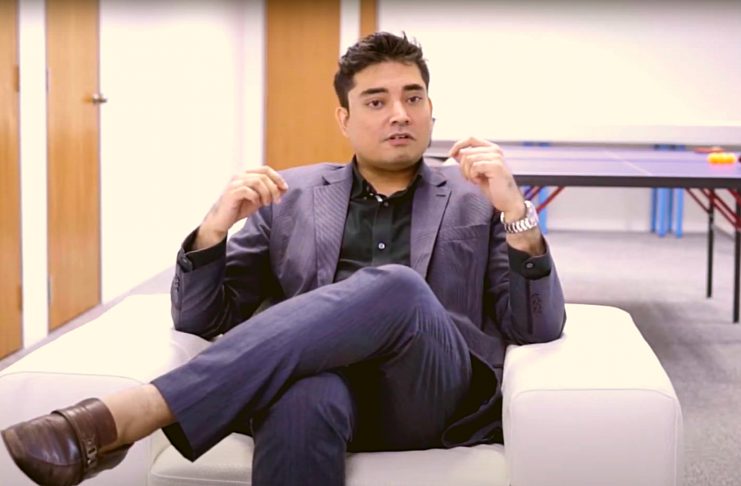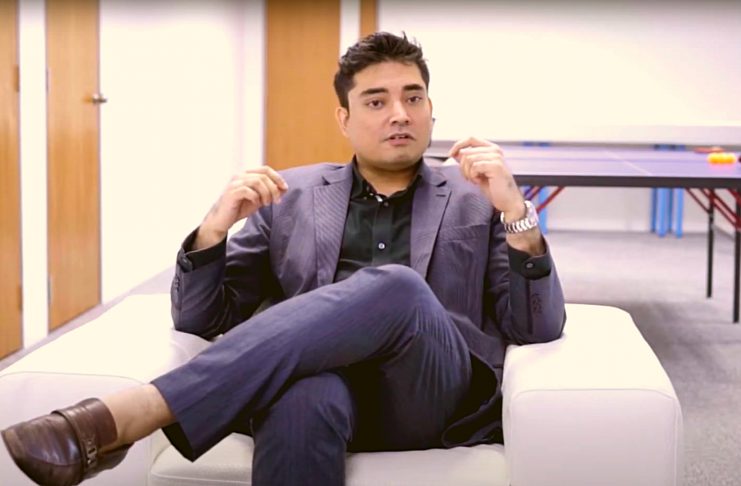The Memory Marvel: Sancy Suraj’s Inspirational Journey as a Motivational Speaker
Sancy Suraj is a name synonymous with memory feats and training. As the CEO of the Knowles Training Institute, The Umonics Method, and Pinnacle Minds, he has trained over 10,000 people worldwide in memory techniques and cognitive skills. With one Guinness world record and six Singapore book of records, all in memorization feats, he has proven himself to be a master of memory.
However, Sancy Suraj is not only a memory athlete and trainer but also a motivational speaker. He has inspired thousands of individuals to develop their memory skills and achieve their goals. In this article, we will dive into his journey as a motivational speaker and entrepreneur and learn about his experiences in memory training.
How did you first become interested in memory techniques and training, and what inspired you to pursue it as a career?

Thank you for the question. My journey with memory techniques and training started at a young age. As a child, I was always fascinated by the power of the human mind and its limitless potential. This curiosity led me to explore various techniques to improve my memory skills. I started experimenting with different methods and eventually discovered the memory palace technique, which allowed me to memorize large amounts of information in a short period of time. I was amazed by the results and wanted to share this knowledge with others.
My passion for memory techniques grew even stronger when I came across the sport of memory competitions. I was intrigued by the idea of competing against others in memorization feats and decided to give it a try. I began training rigorously and soon found myself breaking records and winning competitions. This not only gave me a sense of achievement but also motivated me to continue exploring and innovating new memory techniques.
As I continued to train and compete, I realized that there was a great demand for memory training among individuals and corporations alike. This inspired me to start my own memory training company, Pinnacle Minds, with the goal of sharing my knowledge and helping others improve their memory skills. The success of Pinnacle Minds led me to start Knowles Training Institute and The Umonics Method, where I continue to provide memory training and motivational speaking services to individuals and organizations worldwide.
In summary, my interest in memory techniques and training started at a young age, and my passion for it only grew stronger as I discovered the power of the human mind and the potential to improve memory skills. My experience with memory competitions and the demand for memory training services led me to pursue it as a career and start my own companies.
Can you describe one of your most challenging memory feats or training sessions, and how you were able to overcome it?
Sure, I would be happy to share one of my most challenging memory feats and how I overcame it. One of the most challenging memory feats I ever attempted was memorizing the order of a shuffled deck of cards in the shortest time possible. This feat is a staple in memory competitions and requires not only a high level of memory but also quick recall and mental agility.
During one competition, I was faced with a particularly difficult deck of cards. The cards were shuffled multiple times, making it nearly impossible to remember the order. To make matters worse, the time limit was only a few minutes, which added immense pressure to the challenge.
I knew that I had to stay focused and calm to overcome this challenge. I began by creating a mental image for each card and placing it in a specific location within my memory palace. However, even with this technique, I was struggling to recall the correct order of the cards.
In that moment, I decided to take a step back and breathe. I reminded myself that I had trained for this and that I was capable of achieving this feat. I then visualized myself successfully completing the challenge, feeling confident and focused.
With this renewed confidence, I went back to memorizing the cards, making sure to associate each card with its corresponding mental image. Finally, when the time was up, I was able to successfully recall the order of the shuffled deck of cards.
In conclusion, the key to overcoming this challenging memory feat was to remain calm, focused, and confident. By taking a step back, reminding myself of my capabilities, and visualizing success, I was able to regain my confidence and complete the challenge successfully. This experience taught me the importance of mental resilience and how it can help in not only memory feats but also in many other areas of life.
As a motivational speaker, how do you inspire others to develop their own memory skills and achieve their goals?
Thank you for the question. As a motivational speaker, my goal is to inspire others to develop their memory skills and achieve their goals. To achieve this, I employ various techniques that help individuals understand the power of their minds and the limitless potential they possess.
Firstly, I believe in the power of storytelling. I use my own personal experiences to share stories of how I developed my own memory skills and achieved my goals. This not only helps to build rapport with my audience but also inspires them to take action and develop their own memory skills.
Secondly, I believe in providing practical tips and techniques that individuals can use to improve their memory skills. I break down complex memory techniques into easy-to-understand steps and provide practical exercises that individuals can use to train their memory. This helps to demystify the process of memory training and empowers individuals to take action.
Thirdly, I believe in the importance of mindset. I help individuals understand that developing a strong mindset is key to achieving their goals. I emphasize the importance of discipline, persistence, and resilience in developing memory skills and achieving success in any area of life.
Finally, I believe in the power of community. I encourage individuals to connect with others who are also interested in memory training and to join memory clubs or competitions. This helps to create a supportive environment and provides individuals with the motivation and accountability needed to achieve their goals.
In conclusion, as a motivational speaker, I inspire others to develop their memory skills and achieve their goals by using storytelling, providing practical tips and techniques, emphasizing mindset, and encouraging community building. My hope is that through my speaking engagements, individuals will be empowered to take action and unleash the full potential of their minds.
“Memory is not just about remembering the past, it’s also about creating a better future. By developing our memory skills, we can unlock our full potential and achieve the goals we once thought were impossible. So, let’s train our minds to remember what matters, and use that power to create the future we desire.”
You’ve trained over 10,000 people worldwide – what are some common misconceptions people have about memory training, and how do you address them?
Thank you for the question. Through my experience of training over 10,000 people worldwide, I have encountered several common misconceptions about memory training. These misconceptions can prevent individuals from fully embracing memory training and achieving their full potential. Here are some of the most common misconceptions and how I address them:
Misconception: Only people with a photographic memory can excel at memory training.
- Response: While some individuals may have a natural ability for memory, memory training is a skill that anyone can learn and improve upon. With consistent practice and the use of memory techniques, anyone can improve their memory skills and achieve remarkable results.
Misconception: Memory training is time-consuming and requires a lot of effort.
- Response: While memory training does require effort and practice, it can be easily incorporated into daily routines. Simple memory exercises can be done while commuting or doing household chores, and can significantly improve memory skills over time.
Misconception: Memory training is only useful for memorizing lists or numbers.
- Response: Memory training is a valuable tool for improving many areas of life. It can help individuals retain important information, such as names and faces, academic material, and business strategies. Additionally, memory training can improve cognitive function and brain health, leading to a more fulfilling and successful life.
Misconception: Memory training is only for the young or those with a high IQ.
- Response: Memory training is beneficial for individuals of all ages and intellectual levels. In fact, memory training can be particularly beneficial for older adults, as it can improve brain health and slow cognitive decline.
In conclusion, memory training is a valuable skill that anyone can learn and improve upon. By addressing common misconceptions and emphasizing the benefits of memory training, individuals can overcome their reservations and embrace the power of their minds.
In addition to memory training, you’ve also founded multiple companies – can you talk about your experience as an entrepreneur and how it intersects with your work as a memory athlete and speaker?
Thank you for the question. In addition to my work as a memory athlete and speaker, I have also founded multiple companies. My experience as an entrepreneur has intersected with my work as a memory athlete and speaker in several ways.
Firstly, as an entrepreneur, I have had to rely heavily on my memory skills to manage multiple tasks and responsibilities. Effective time management and organization are crucial to the success of any business, and my memory skills have helped me to stay on top of my responsibilities and achieve my goals.
Secondly, my experience as an entrepreneur has given me a unique perspective on the importance of memory training. As a business owner, I understand the value of being able to retain information, such as important contacts and business strategies. Memory training has helped me to excel in these areas and has given me a competitive edge in the business world.
Finally, my work as a memory athlete and speaker has also intersected with my experience as an entrepreneur. Through my speaking engagements and memory training programs, I have been able to connect with individuals from all walks of life and have helped many people to improve their memory skills and achieve their goals. This has also allowed me to network and connect with other business professionals, which has been invaluable to the growth of my companies.
In conclusion, my experience as an entrepreneur and memory athlete and speaker have intersected in numerous ways. My memory skills have been essential to my success as a business owner, and my work as a memory athlete and speaker has allowed me to help others improve their memory skills and achieve their goals. Ultimately, my goal as both an entrepreneur and memory athlete and speaker is to inspire others to unleash the full potential of their minds and achieve success in all areas of life.
“Memory training and entrepreneurship are like two sides of the same coin, both require effective organization, strategic planning, and the ability to retain valuable information. As an entrepreneur, memory training has given me a competitive edge, while my experience as a business owner has taught me the true value of a sharp memory. Together, they have allowed me to unleash the full potential of my mind and inspire others to do the same.”
Sancy Suraj’s interest in memory techniques started at a young age when he witnessed his grandfather struggling with Alzheimer’s disease. He was inspired to learn about memory techniques and their potential to improve cognitive abilities and prevent memory loss. Through his own training and dedication, he has become one of the most accomplished memory athletes in the world.
Despite his impressive accomplishments, Sancy Suraj faces many challenges in his training and sessions. One of the most challenging feats he has accomplished was memorizing the order of 10 decks of shuffled cards in under an hour. He overcame this challenge through perseverance, practice, and the use of mnemonic devices.
As a motivational speaker, Sancy Suraj inspires others to develop their own memory skills and achieve their goals. He emphasizes the importance of mindfulness, brain exercise, and mnemonic devices in improving memory and cognitive abilities. By sharing his own experiences and successes, he inspires others to believe in themselves and their potential.
As an entrepreneur, Sancy Suraj has founded multiple companies, which intersect with his work as a memory athlete and speaker. He has used his business acumen to create effective memory training programs and build a successful career in the field of memory training and cognitive skills development.
What advice do you have for individuals who are looking to improve their memory and cognitive abilities, and what are some practical tips or exercises they can do to get started?

Improving your memory and cognitive abilities can have numerous benefits, from enhancing your academic and professional performance to improving your overall quality of life. Here are some practical tips and exercises that you can do to get started:
- Practice mindfulness and focus: Mindfulness is the act of being present and fully engaged in the present moment. By practicing mindfulness, you can improve your focus and attention span, which can in turn enhance your memory and cognitive abilities. To practice mindfulness, try meditating for a few minutes each day or simply take a few deep breaths and focus on your surroundings.
- Exercise your brain: Just like your body, your brain needs exercise to stay healthy and strong. Engage in brain teasers, crossword puzzles, or other mentally stimulating activities to keep your brain sharp and improve your memory and cognitive abilities.
- Use mnemonic devices: Mnemonic devices are memory aids that can help you remember information by associating it with something else. For example, you might use the acronym “ROYGBIV” to remember the colors of the rainbow. Mnemonic devices can be particularly helpful for remembering lists, names, and other types of information.
- Get enough sleep: Sleep is essential for memory consolidation and cognitive function. Aim to get at least 7-8 hours of sleep each night to keep your brain functioning at its best.
- Practice visualization: Visualization is a powerful tool for improving memory and cognitive abilities. Try visualizing images or scenarios in your mind to help you remember information more effectively.
In addition to these tips and exercises, it’s important to maintain a healthy lifestyle, including regular exercise, a balanced diet, and reducing stress levels. By taking care of your body and mind, you can improve your memory and cognitive abilities and enhance your overall quality of life. Remember, with practice and dedication, anyone can improve their memory and cognitive abilities.
“Improving your memory and cognitive abilities is not a sprint, it’s a marathon. By practicing mindfulness, exercising your brain, using mnemonic devices, getting enough sleep, and visualizing effectively, you can enhance your mental prowess. Remember to also nourish your body with a healthy lifestyle and reduce stress levels. With consistent effort, you can improve your cognitive fitness and achieve your full potential.”
Sancy Suraj’s journey as a memory athlete, trainer, and motivational speaker has been an inspirational one. Through his dedication and hard work, he has achieved impressive feats in memory training and inspired thousands of individuals to develop their own memory skills. His story serves as a testament to the power of perseverance, dedication, and the potential of the human mind.














